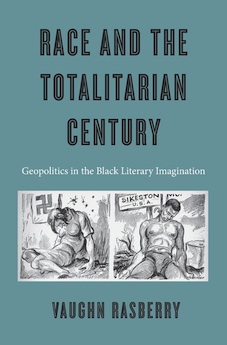Shortlisted for the 2017 Christian Gauss Award
By Louis J. Kern
This volume, which received the Ralph Bunche Award of the American Political Science Association, presents a revisionist interpretation of the literary response and resistance of black intellectuals to the binary consensus model of liberalism (American democracy) vs. totalitarianism (Soviet international communism) of the period 1945-65. It blends history, literary criticism, political theory, and philosophical reflection in relation to post-colonial and developmental theories and conceptions of modernity in emerging nations into “an experiment in historiography,” a “cross-historical tableau” of the Cold War dilemma of black intellectuals.
WWII had not brought the definitive triumph of liberalism over totalitarianism; fascism had been defeated, but Soviet communism had replaced it as totalitarianism redivivus. For African Americans, racial justice had been frustrated after WWII; violence and Jim Crow persisted, and vaunted American democracy subsisted in racial liberalism. Vaughn Rasberry examines key international events—the Suez Canal Crisis (1956), the Hungarian Revolt (1956), the Arab-Israeli War (1967), and the Bandung Konferensi Asia-Afrika (1954) in the context of non-aligned nations’ opposition to persistent colonialism and neo-colonialism.
Soviet propaganda highlighted racial discrimination in the U.S. and represented itself as anti-racist, and many blacks saw the USSR as authoritarian rather than totalitarian. Newly independent African nations, as Richard Wright put it, suffered from a “terror in freedom”; the problem was how to navigate modernity without becoming enthralled to one or the other superpower, i.e., re-colonization. American blacks saw Africa’s need for strong, authoritarian control to stabilize nations and ensure modernization. Rejecting orthodox American policy that saw Third World non-alignment as a lure to communism and African governments as totalitarian, many black Americans supported African leaders like Ghana’s Kwame Nkrumah and Egypt’s Gamal Abdel Nasser, and were inspired by Pan-Africanism, Pan-Arabism, and Pan-Islamism.
After trenchant discussion of divergent conceptions of totalitarianism in the context of post-colonial theory, the second half of the volume is devoted to the recuperation of the late careers of three authors who rejected bourgeois normativity and Cold War consensus in favor of the collective social and political structures of communism—W.E.B. DuBois, Shirley Graham, and Richard Wright. Many critics have ignored or devalued their works of the 1950s, in DuBois’ case as a betrayal of liberalism and “an embarrassing example of his supposed seduction by the delusions of Soviet propaganda,” but Rasberry sees DuBois’ work as a revolutionary experiment probing the relationship between communism and the African diaspora. Here as elsewhere, Rasberry reclaims lesser-known works like DuBois unpublished manuscript “Russia and America” (1950), C.L.R. James’ Mariners, Renegades, and Castawys (1953), and J.A. Williams’ The Man Who Cried I Am (1967).
Rasberry is most convincing in his consideration of the literary dimension of the black “anticolonial critique of Cold War geopolitics,” but despite astute readings of cultural and political theories, there is no definitive evidence that these black writers read and applied the insights of Alain Badiou, Theodor Adorno, et al. Their connection is connotative rather than denotative, and these discursive theoretical passages tend to disrupt the narrative and structural integrity of Rasberry’s central themes. Historically, the work is adequate, but too often fails to provide solid dates (cf. Bandung Conference). At times it is annoyingly repetitive—Stalin’s remark about the side with the most iron winning appears at least three or four times in different contexts. Though not for the casual reader, this is a very useful and persuasive intervention in the scholarly consideration of the diasporan response to post-colonialism during the Cold War.
Louis J. Kern (ΦBK, Clark University,1965) is professor emeritus of history at Hofstra University. Hofstra University is home to the Omega of New York chapter of Phi Beta Kappa.




